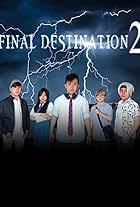1. Plot Summary
In this, the final season of Jessica Jones, Jessica teams up with her adoptive sister Trish Walker to confront a highly intelligent, manipulative psychopath named Gregory Sallinger. Trish, who has been struggling with her own moral compass and desire for power after gaining enhanced abilities in prior seasons, becomes more deeply involved in walking the line between heroism and vigilantism. As they pursue Sallinger, a devastating personal loss splits Jessica and Trish, revealing conflicting ideals. The season explores not only the threat Sallinger poses, but also how Jessica’s past, her relationships (especially with Trish, Jeri Hogarth, Malcolm), and her sense of what being a “hero” means are tested.
2. Notable Elements
- Character Focus vs. Villain Depth: Sallinger is a more realistic kind of villain—less flashy supervillain, more psychological threat. His manipulations are subtle but chilling.
- Jessica–Trish Relationship: One of the season’s greatest strengths is the tension and evolution between Jessica and Trish. Their divergence, conflicting morals, and emotional stakes make for compelling drama.
- Pacing & Structure: The early half of the season is slow, with many subplots. Some episodes shift viewpoint (e.g. Trish’s perspective) and replay scenes from different angle to deepen character understanding. The last episodes build more momentum.
- Strong Performances: Krysten Ritter’s portrayal of Jessica is consistently grounded, combining vulnerability, anger, sarcasm, and moral complexity. Rachael Taylor in Trish’s role also shines, especially in episodes that delve into Trish’s past and her psychology.
- Themes & Tone: The season sits heavily in moral ambiguity—what defines a hero, what costs are acceptable, what results from trying to do the right thing in a flawed world. It feels darker, more introspective.
3. Themes & Messages
- Power and Responsibility: Trish’s arc especially embodies the question of whether gaining power obliges one to act, and whether one can remain good. The show asks: does having power mean you must use it, and how?
- Morality in the Gray Zone: Many characters make choices that are neither purely good nor purely evil. The show challenges black-and-white notions of justice.
- Trauma, Loss, and Identity: Jessica’s past (her trauma with Kilgrave, her family relationships) continues to define her; loss in th is season forces change. Identity is tested—who you were, who people expect you to be, who you choose to be.
- Consequences of Actions: The idea that doing something “for the right reason” can still have harmful consequences is central. Jessica and Trish both confront sacrifices, unintended fallout from their choices.
4. Personal Impressions
What I liked:
- I appreciated how the show didn’t shy away from its darker edges. The emotional journeys—especially Jessica’s fight to define her own moral code—feel earned.
- The performances are strong; the acting makes the audience invest in characters even when they make flawed choices.
- The ending, while not perfectly tidy, has real weight—it feels like it acknowledges that life isn’t clean or fully resolved, which fits the tone.
What didn’t work as well:
- The first half of the season drags. Some subplots feel extraneous, and momentum is slow; it takes a while for the main villain’s threat to feel urgent.
- Some characters are underused or their arcs feel less satisfying (e.g. Malcolm, Jeri Hogarth—while interesting, they sometimes divert from the central tension without adding much).
- The villain Gregg Sallinger, while interesting, in some places feels not quite as developed or memorable as previous villains (like Kilgrave). Some viewers felt not enough backstory.
5. Audience Recommendations
This season will especially appeal to:
- Fans of Jessica Jones who want a thoughtful, character-driven conclusion to her story.
- Viewers who like superhero stories that focus more on psychological drama than on spectacle.
- Those who enjoy moral complexity and aren’t expecting perfectly neat resolutions.
Might be less satisfying for:
- Viewers wanting fast pacing or strongly defined external threats—this season is more internal conflict and slower build.
- Audiences who prefer superpowers to be the focus rather than interpersonal drama.
- Those who expect every subplot to tie up neatly.
6. Conclusion & Rating
Overall, Jessica Jones – Season 3 is a worthy finale. It isn’t perfect, but it delivers meaningful character arcs, emotional stakes, and moral exploration. It gives Jessica room to grow, strains her relationships in compelling ways, and ultimately ends on a note that feels appropriate for the series’ tone.
Final Recommendation: If you’ve followed Jessica’s journey from the start, this season is a strong, bittersweet capstone. If you care more about characters and moral questions than action, this will especially resonate.
Five-Star Rating: ⭐⭐⭐⭐ out of 5
Watch more:




